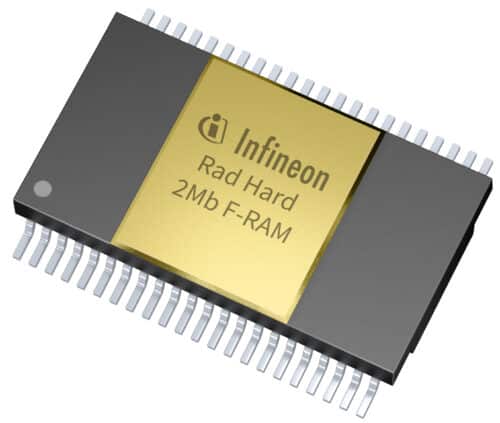The industry’s first radiation-hardened non-volatile memory devices are designed for extreme environments like space and offer reliability and endurance.

Infineon Technologies AG focuses on space-based applications, with its products used in satellites, Mars rover instruments, and space telescopes, all of which require high reliability under adverse conditions. The company has announced the availability of the industry’s first radiation-hardened (rad-hard) 1 and 2 Mb parallel interface ferroelectric-RAM (F-RAM) non-volatile memory devices.
The company claims that the memory portfolio offers reliability and endurance, with up to 120 years of data retention at 85 degrees Celsius, random access and full memory write at bus speeds. The F-RAM devices are intrinsically rad-hard, making them suited for the mission requirements of space-based applications that historically have used slower EEPROM non-volatile storage devices. Features compared to alternatives include faster memory random access, better data security with instant non-volatile write technology, low power, with programming voltage down to 2 V and a maximum operating current of 20 mA.
The radiation-hardened F-RAM devices are designed for various applications, including data storage for sensors and instruments, calibration data logging, secure key storage for encryption, and boot code storage. These devices are suitable for demanding environments such as outer space, avionics, and military applications, operating across a wide temperature range from -55°C to 125°C. The new parallel interface F-RAM models from Infineon offer superior non-volatile memory capabilities due to their unique chemical composition, which utilizes an instantaneous atomic state switch rather than the trapped charge method found in EEPROM technologies. This design ensures immunity to soft errors, magnetic fields, and radiation effects. Additionally, these devices do not require software to manage page boundaries and support nearly limitless endurance (10^13 write cycles), eliminating the need for wear leveling.
“As more space applications are architected to process data on-system, and not on-ground via telemetry, there is increasing demand for high-reliability, non-volatile memory to work in tandem with space-grade processors and FPGAs for data-logging applications” said Helmut Puchner, Vice President, Fellow Aerospace and Defense, Infineon Technologies.






